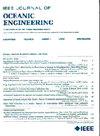Guest Editorial: Introduction to the Special Issue on Advanced Machine Learning Methodologies for Underwater Image and Video Processing and Analysis
IF 5.3
2区 工程技术
Q1 ENGINEERING, CIVIL
引用次数: 0
Abstract
In the realm of ocean engineering, underwater images and videos serve as vital carriers of information. However, the challenging conditions of underwater imaging often lead to quality degradation in captured content. These degradations, encompassing issues, such as diminished contrast, color casts, blurred details, and uneven brightness, not only hinder human perception but also present formidable obstacles for leveraging underwater media in ocean engineering applications. Despite advancements in the processing and analysis of underwater images and videos, the methodologies employed thus far have proven to be less than optimal. Furthermore, the direct application of established in-air techniques to underwater scenarios remains problematic due to the distinct attributes of underwater imaging, notably the effects of light selective absorption and scattering. As a result, there is a pressing need for fresh theories, methodologies, and applications that cater specifically to the challenges of processing and analyzing underwater visual content. Recent progress in advanced machine learning methodologies provides an avenue of promise, offering novel insights and approaches to address the issues of underwater images and videos.特邀编辑:水下图像和视频处理与分析的高级机器学习方法特刊简介
在海洋工程领域,水下图像和视频是重要的信息载体。然而,水下成像的挑战性条件往往会导致拍摄内容的质量下降。这些质量下降包括对比度降低、偏色、细节模糊和亮度不均等问题,不仅阻碍了人类的感知,也为在海洋工程应用中利用水下媒体带来了巨大障碍。尽管水下图像和视频的处理与分析技术不断进步,但迄今为止所采用的方法仍未达到最佳效果。此外,由于水下成像的独特属性,特别是光的选择性吸收和散射效应,将成熟的空气中技术直接应用于水下场景仍然存在问题。因此,迫切需要新的理论、方法和应用来专门应对处理和分析水下视觉内容的挑战。先进机器学习方法的最新进展为解决水下图像和视频问题提供了新的视角和方法,是一条大有可为的途径。
本文章由计算机程序翻译,如有差异,请以英文原文为准。
求助全文
约1分钟内获得全文
求助全文
来源期刊

IEEE Journal of Oceanic Engineering
工程技术-工程:大洋
CiteScore
9.60
自引率
12.20%
发文量
86
审稿时长
12 months
期刊介绍:
The IEEE Journal of Oceanic Engineering (ISSN 0364-9059) is the online-only quarterly publication of the IEEE Oceanic Engineering Society (IEEE OES). The scope of the Journal is the field of interest of the IEEE OES, which encompasses all aspects of science, engineering, and technology that address research, development, and operations pertaining to all bodies of water. This includes the creation of new capabilities and technologies from concept design through prototypes, testing, and operational systems to sense, explore, understand, develop, use, and responsibly manage natural resources.
 求助内容:
求助内容: 应助结果提醒方式:
应助结果提醒方式:


